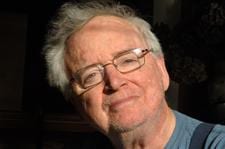One of BC’s giants of the gay liberation movement died Jan 4 at the age of 78.
Floyd St Clair is mourned by his partner of 58 years, David Watmough, one of BC’s first openly gay authors.
“I’ve been very cherished by having Floyd’s love poured over me,” says Watmough, 82. “He’s the greatest thing that ever happened to me.”
St Clair died as a result of fluidation of the heart, Watmough says. “He didn’t have any strength to have an operation after that. He died in his sleep.”
Tributes to the much-loved University of British Columbia (UBC) professor of French literature and his groundbreaking life have been flowing in since St Clair’s death.
“His legacy, I think, is his absolute refusal to live in some little nook or niche,” Watmough says. “He wanted the whole world.
“His other legacy is me and the 20 books that couldn’t have written without him at my side.”
Little Sister’s Bookstore manager Janine Fuller knew St Clair for many years. She’s deeply saddened by the loss.
“What an amazing person,” she says. “I’m lucky to have known him and had him in my life.”
She says the couple’s dinner parties were “legendary.”
The gay community owes a debt of gratitude to the path that St Clair, Watmough and friends such as author Jane Rule and her partner Helen Sonthoff blazed, says Fuller.
“They were all out together at the same time. This was really important to the history of all our lives. They were pioneers.”
The California native met Watmough in 1951 at a Wed night social at St George’s Anglican Church in Paris.
Watmough was 25 years old and St Clair was 21, studying in Paris on a French government scholarship.
Together, they proudly stepped out of the closet and slammed the door shut behind them in the late 1950s.
While they did encounter some homophobia at the time, Watmough says it wasn’t as much as some might think.
“All the world loves a lover,” he says. “We were happy in our relationship. It was a strength. It was an armour.”
“For David and Floyd, a closet was a place to hang their guests’ coats. They were never secretive, and never ghettoized, either,” playwright and screenwriter Michael Mercer once observed.
Little Sister’s Bookstore co-owner Jim Deva compares Watmough and St Clair to 20th century writer couple Gertrude Stein and Alice B Toklas. “It was something beyond marriage,” he says. “It was a meeting of souls.
“I don’t think David could have accomplished what he did without Floyd,” Deva continues, describing Watmough as a pivotal author in both the gay and Canadian context.
The couple lived in Kitsilano for more than 40 years before purchasing a new residence in the Boundary Bay area of Tsawwassen in 2004.
A specialist in 19th century French literature, St Clair taught in the Department of French, Hispanic and Italian Studies at UBC starting in 1963 as a lecturer.
He was appointed as an assistant professor when he received his doctorate from Stanford in 1967.
All you had to say was “Floyd” in the Faculty of Arts and people knew who you were talking about.
In class he was unstoppable, running everywhere, knowing all his students by name and making sure everyone was engaged.
“I think for quite a few of us teaching certain things —literature teachers are the ones I obviously think of —it’s a disease, it’s a malady, it’s a passion or something,” he once said.
“It’s one of the most gratifying things in life to see people who really respond to your own passion for literature and other things around it —painting, music, human-being watching,” he added.
In 1971, he won a Master Teacher Award from UBC.
“He was a very popular teacher,” says French Department head André Lamontagne. “He left a deep impression on those he taught.”
In a notice of St Clair’s death sent out at UBC, Richard Hodgson writes: “Both his students and his colleagues will remember his sparkling personality; his wit; his extraordinary sense of humour; his boundless energy; his life-long interest in people and his love of dogs; and perhaps most of all his unquenchable enthusiasm for literature, opera and life.”
St Clair was the first to admit he was not often published in academic circles. Instead, he wrote opera criticism for magazines in New York, London and Toronto, and for CBC radio.
In discussing his pending 1996 retirement in a 1989 interview, St Clair said he planned to read and listen to music he’d not had time for in the past.
‘”I teach a book —Candide by Voltaire —where at the end the only lesson in life Voltaire gives is to cultivate your garden. And I think, well maybe if I just had a year off to really cultivate my garden it would look a little more presentable and my soul would profit from it too,” St Clair said.

 Why you can trust Xtra
Why you can trust Xtra


